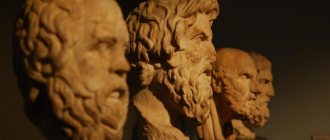Man is nature. What is human nature. Human Nature
– one of the most important categories of social philosophy, the starting point of the vast majority of studies of social problems. In ancient Eastern wisdom, man acted as an extremely small particle of the socio-cosmic whole, not having self-sufficient personal value; in the ancient world, he was represented as a drop, in which, nevertheless, this socio-cosmic whole is repeated in a concentrated form and is completely commensurate with it, although man was already seen as an amateur being. In the Middle Ages, the essence of man was seen in that particle of divine, spiritual fire that trembles in his womb, overcoming the framework of external bodily limitations. In modern times, on the one hand, a person appears as a spiritual being, capable of thinking rationally, and on the other hand, personal, amateur qualities are highlighted in him, which are determined through his external social characteristics. Thus, human nature appears as something completely devoid of any certainty. Continuing the traditions of Western European philosophy of the 19th century, which represented man in his duality (physical nature and spiritual essence), modern social philosophy considers him from two sides - from the point of view of his biological nature and social essence. Eurasian philosophy puts forward the concept of trinity, the presence of three modes in a single human nature: spirit, soul and body (corporality, sociality and spirituality), believing that the essence of man is manifested in his spirituality. This allows us to more accurately formulate and solve the problems of a person’s spiritual rebirth and ridding him of vices, problems associated with the formation of a person as an individual, as a full and free member of society, an active subject of all social relations, the creator of a civilization of wisdom.
Personality
Secular understanding of personality
Personality
- this is a person as a social and natural being, endowed with consciousness, speech, and creative capabilities. /Encyclopedic Dictionary/
In psychology:
✦ Any person who has consciousness. ✦ A person who has a level of psyche that makes him capable of managing his behavior and mental development.
In modern culture, the word “personality” has three meanings: ✦ personality as a system-forming characteristic of a person’s internal life (that internal thing that organizes and explains a person’s internal life and behavior); ✦ personality as an individual with characteristics (with a certain set of habits); ✦ personality as a title (one is not born as a person, one becomes a person!)
Theological understanding of personality
Personality is the ontological basis of man, irreducible to nature, free, open, creative, unique, holistic in the sense of both indivisibility and indestructible identity, unknowable by analytical objectifying methods, which determines the way of being of his individualized nature.
"Image of God" and "personality"
“Image of God” and “personality” are interconnected concepts, but not identical.
The image of God is an inalienable given, constantly promoting the rapprochement of man with God. It always has a spiritually positive orientation and is an ontological basis for the individual.
Personality is a manifestation of the image of God in a person and, like all other manifestations of the image of God (reason, creativity, freedom, immortality, etc.), can have different moral orientations and change over the course of human existence - both improve and degrade.
The concepts of “image of God” and “personality” are interconnected.
God is a Person, and man is a person, because he is endowed with the image of God.
Personal existence is a manifestation of the image of God, that is, the relationship of concepts is built according to the type of cause and effect.
Personality is the most valuable thing in a person
Each person is important to God not as an element of created nature, but precisely as a unique personality capable of perceiving good and giving love.
In the Holy Tradition of the Church, the concept of personality was correlated with the words “heart”, “sovereign”, “mind”, “inner man”, “autocracy”, “spirit”, “soul”.
Personal world of a person
– a set of attitudes towards oneself, towards the world, towards another, desires, free choices, as well as responsibility for all this. A person’s personal world belongs only to him, and is always subjective and individual in nature.
Basic characteristics of human personality
Personality is one of the manifestations of the image of God in man.
In ordinary language, two levels of attitude towards a person are clearly distinguished: ✦ as a unique individual (about a person as an individual the question is “who?”), ✦ as a natural being (about human nature we ask “what?”).
Personality does not exist in itself outside of a specific natural substance.
Personality receives existence together with the soul and body of a person and does not preexist with them. That is, the conception and birth of every person relates not only to nature, but also to the personal principle.
The personality, having received the beginning of existence from God, is then indestructible, despite all natural changes, which imparts to every person the eternal, enduring meaning of life.
The human personality (“I”) not only resides in human nature, but clearly recognizes itself as the “lord”, “master”, “owner” of its nature, contains and shapes it in a unique way
. This is expressed in the phrases: “my body”, “my soul”, etc.
A person sets a unique way of existence for his nature, which manifests itself both in small things (handwriting, gait) and in a global spiritual perspective (life with God or rapprochement with fallen spirits).
A personal personality makes a person recognizable at different periods of his life, despite constant natural changes (growth, aging, transformation, resurrection).
The relationship between personality and nature in a person is dynamic and can take different forms.
.
In accordance with God's plan, man as an individual must master his nature and improve it so that it not only does not interfere with anything, but also contributes to the fulfillment of his destiny. The ultimate ideal in this for man is Divine existence, where each Hypostasis possesses the fullness of the single Divine nature.
Another type of interaction between the personal and the natural in a person is also possible.
A person can become enslaved to his nature, so that he gradually switches more and more to providing for natural needs and does not realize his divine destiny. To the extent that a person is conditioned by natural needs, he is degraded.
Personal development
manifests itself in an increasing mastery of one’s natural properties and control over them.
In everyday life, this is expressed primarily in the ability to overcome one’s “I want” (or “I don’t want”) in favor of the divine “need” (that is, the will of God).
Personality is absolute and created
In theology, a distinction is made between the concepts of absolute and created personality. The absolute persons are the Father, the Son and the Holy Spirit. Created personalities are people and Angels.
Absolute Divine personalities are perfect, unchanging, eternal. Created personalities are called to perfection, are changeable, have a beginning, but are then indestructible.
And after death, and in heaven, and in hell, a person retains his personal nature.
A person needs to communicate with other people
Personality is revealed, changed and enriched in dialogue.
Man has an ontological need to communicate with other personalities: God, Angels and people. For the same reason, a person strives to create a family.
The individual longs to hear and be heard.
The highest form of interpersonal communication is love
In love, a person gives himself completely to his beloved and at the same time completely gains him. In love, two become one without losing personal uniqueness. Moreover, the personality gets the opportunity to open up in a new space - the personal space of another. Love is the main means for understanding personality.
The concepts of “image of God” and “personality” are not subject to formal definition
Since the image of God and the personality of man are “rooted” in God, who cannot be defined, then these concepts are not covered by human words. However, the lack of strict definitions does not at all deprive us of the opportunity to constructively use these terms in anthropological reasoning. In fact, in Christian anthropology, the words “image of God” and “personality” are in many ways sign words pointing to a mysterious deep reality in man.
Personal free choice
The uniqueness of the individual is revealed most of all in dialogue and in actions based on personal free choice
Personal free choice is the starting point of every human action. In these actions, the personality is actualized and its content is revealed.
For example, if a person wants to drink, then this is a natural manifestation of his nature. But as a person, he chooses a drink and satisfies the natural need that arises (drinks water, tea, wine...).
In action, a person assumes responsibility before God, people and the world around him. Based on the choice he made, the decision he made, he will be judged before God.
NAME
A required personality attribute is NAME
– a verbal name that is associated with a specific person.
A name is not a personality, it does not contain a personal element, but it allows you to address a personality and enter into a dialogue with it.
The name is secondary to the personality. Ideally, the name should meaningfully correspond to the named person.
After the Fall, due to the darkness of human consciousness, people are not able to give such godly names. And yet, communication with a person occurs through a name, even a very arbitrary one.
It is the individual who receives talents from God, disposes of them and will be responsible for their choices and actions before the Creator.
In relation to each person, God has His unique plan, which, however, is not predestination.
In its implementation, each person is absolutely free and responsible before God.
Personality attributes
Self-awareness
– the ability to contemplate oneself as a rational being, different from others, as a unique, indivisible “I”.
In a certain sense, personality is a free consciousness aware of itself in its uniqueness. Subjectively, identification of oneself as a person occurs through reflection.
Self-determination
– the ability to realize oneself in the space of being, to observe the movement of one’s “I” in time, in history.
Liberty
– independence of the individual (even from God) when making decisions.
Choice
– the ability to prefer, choose, make decisions and implement them.
Faith
– the ability to self-determinate without relying on personal experience, theoretical reasoning and natural foundations.
Responsibility
– willingness to accept the consequences of decisions made and actions taken.
In addition, most categories from the moral sphere of human life have personal conditionality: good, evil, truth, justice, trust, doubt, hope, love, reverence, fear, etc.
Creativity, dominion, immortality, integrity, indivisibility, uniqueness, etc. are also integral attributes of personality.
Personal terminology
When presenting the doctrine of man, it is convenient to use three approaches: personal, natural-personal and natural, which correspond to three terms - “personality”, “individuality” and “individual”.
Personality
V.N. Lossky: personality is the irreducibility of man to nature.
Personality = a specific person (individuality) – general human nature.
If we want to realize the personal principle in a person, then we must, as it were, not notice in him the natural characteristics common to all people and see in him the principle that distinguishes him from other people, makes him unique.
Individuality
A specific person, considered as an integral natural-personal subject, in his unique originality.
With an individual approach, as opposed to a personal approach, a person must be described holistically, taking into account both personal characteristics (self-awareness, self-determination, freedom, etc.) and natural properties (mind, will, feelings, bodily structure, etc.).
Individuality = personality + general human nature.
Individual
A person considered in a general natural or social aspect as an individual representative of any homogeneous group of people, without taking into account his unique personal characteristics. For example: person, man, woman, student, buyer, client, etc.
If any reasoning does not take into account the personal specifics of specific people, then in this case people are considered as individuals (an example of such a statement: “for life, a person needs a home, family, work and food”).
Individual = specific person (individuality) – personality.
"Face", "face", "mask"
Pavel Florensky proposed to describe key states of personality using the terms “mask”, “face”, “face”.
"Mask"
– a person who lives contrary to God-likeness;
“face”
is a person on the path of acquiring the likeness of God;
“face”
is a person who has achieved the likeness of God to such an extent that for others her godlikeness becomes obvious.
This terminological distinction seems very important and convenient for describing the development or degradation of a person’s personality.
Man is nature or not. How to distinguish what nature this or that object belongs to?
Let's try it together.
What nature is a sunflower part of? A sunflower is born - a sprout hatches from the seed. The sprout is growing. The roots take nutrients from the ground, and the leaves take carbon dioxide from the air - the sunflower feeds. The plant breathes by absorbing oxygen from the air. A sunflower produces seeds (seeds), which means it reproduces. In the fall it dries up and dies. Conclusion: sunflowers are part of living nature.
A person is born, grows, eats, breathes, has children, dies, which means we can also be safely classified as living nature. Man is part of nature.
The Moon, the Sun, a spring, stones do not grow, do not feed, do not breathe, do not give birth, which means they are bodies of inanimate nature.
The snowman, house, cars are made by human hands and do not belong to nature.
But there are also bodies of inanimate nature that possess certain characteristics of living organisms.
For example, crystals are born, grow, and collapse (die). A river is born from the melting of a glacier, grows when small rivers flow into it, and dies when it flows into the sea. An iceberg is born, grows, moves, dies (melts in warm seas). A volcano is born, grows, and dies with the cessation of eruptions.
But they all DO NOT eat, DO NOT breathe, and DO NOT give birth.
If you break a piece of chalk in half, you get 2 pieces of chalk. Chalk remained chalk. Chalk is an inanimate object. If you break a tree or split a butterfly into pieces, they will die, because the tree and the butterfly are living things.
In elementary school, difficulties arise in determining whether an object belongs not only to living and inanimate nature, but also to nature in general. Will you be able to complete the task correctly?
Find a group in which all objects belong to inanimate nature:
a) sun, water, earth, stones. b) moon, air, lunar rover, stars. c) ice, earth, water, ship.
The correct answer is a). The lunar rover and the ship do not belong to inanimate nature, they do not belong to any nature, because they were created by human hands.
Man is nature's proof. Human connection with nature
Man and nature are inextricably linked. We are hugely dependent on the world around us. Not so long ago, the prevailing opinion was that man is the king of nature, its rightful owner. However, today it is clear that we are just a tiny particle in the world.
Human interaction with nature can be harmonious only when we treat its gifts with respect and care. People are one with the environment, and therefore must take responsibility for their actions and evaluate their consequences.
Man is an integral part of the world
In the process of our life, we largely depend on nature. It gives us much needed things like air, water, light, food. It depends only on us in what form we will preserve all these valuable resources for ourselves and subsequent generations. The population in all corners of the planet is developing, building its life and work activities, focusing on natural conditions and the climate in the place of residence. The lifestyle of people living near the warm sea is very different from life in the harsh northern conditions.
Despite its seemingly quite strong ability to change natural conditions, change river beds and landscapes, humanity is still highly dependent on its environment. Disasters such as volcanic eruptions, earthquakes, tsunamis and many others can destroy entire cities and even civilizations. Economic development and the creation of new progressive technologies are also not possible without the use of natural resources.
In recent decades, it has become increasingly obvious that nature cannot endlessly satisfy all the needs of people if they do not give anything in return. The basis of a harmonious life should be the awareness that a person is an integral part of the world around him, and, therefore, must take care of and protect it, wisely use all resources without harm to nature.
How humanity affects the Earth
From the moment a person became intelligent and gained the opportunity to use tools, his influence on the surrounding conditions and their changes began. Under the influence of our forces, many changes have occurred in the environment, both positive and negative. The positive aspects of human influence include the creation of national parks and reserves, where many rare species of animals and plants can be preserved from extinction. Such activities make it possible to expand the biological diversity of species existing on the planet. By creating artificial irrigation systems, we help increase the area of fertile soils and use them effectively.
Unfortunately, nature suffers great damage from the unreasonable and ill-considered actions of people. For example, deforestation destroys the natural habitat of many animals and plants, leading to a decrease in oxygen production, which, in turn, inevitably causes global warming. Deserts often form in place of cleared forests, since after the disappearance of trees the top fertile layer of soil is easily eroded.
Rapid population growth leads to the need to use new technologies in agriculture to provide food. If previously the fertile soil was not constantly exploited, giving it some time to rest, now people are plowing up more and more areas and using them without interruption, thereby reducing fertility.
For faster growth, modern fertilizers are used, which have a negative effect on soil and water. We build a huge number of factories, but we care little about how much waste they emit into the atmosphere and how much garbage ends up in the water. In the Pacific Ocean there is a huge zone completely covered with debris floating on the surface, which inevitably leads to the extinction of many species of oceanic animals. Cities located on freshwater rivers dump sewage and industrial waste into them every day.
Thus, we not only harm nature, but also trap ourselves by reducing the amount of water suitable for drinking. The lack of fresh water is already a big problem in some areas of the planet.
Tips for saving nature
If we want to learn how to have a less destructive impact on nature, we should take a few simple steps:
- for the effective and rational use of mineral resources, it is necessary to improve methods of their extraction, reducing the amount of waste and harmful emissions;
- It is necessary to use the resources of the animal and plant world in such quantities that this does not lead to the extinction of individual species.
- it is necessary to widely introduce the use of alternative energy sources in everyday life and production.
For a more detailed introduction to the topic, it is recommended to view educational presentations, where all the information is presented in an accessible and understandable form. The sooner humanity begins to treat nature more carefully, the better we will be able to preserve all its beauty and wealth for our children and grandchildren.
VII. Living Worldview and Natural Religion
All attempts to explain religious consciousness in a person as an accidental or necessary product of the external conditions of human life are fundamentally sinful in the sense that they completely do not take into account the position and significance that the human personality receives in religion. All scientists - interpreters of religion, both ancient and new, for some reason are interested in only one thing, what exactly has a person ever thought or is thinking about God and where a person could get his thoughts about Him. Meanwhile, when thinking about God, a person thinks about himself, and a person’s religious consciousness in reality is always and certainly an integral part of his self-awareness. If a person came to the idea of God not from knowledge of himself, but from knowledge of the external world, then he could, of course, believe
into the existence of God, but only from this faith of his did no religion ever arise.
He could only
deistically, i.e. could recognize His existence only as the first cause, the existence of which completely satisfactorily explains for man the existence of the knowable world. But such a faith, obviously, has the same meaning and the same significance as the faith of a materialist in the real existence of matter or the faith of some chemist in the real existence of atoms. No relation to the object of faith can arise from such epistemological considerations at all122. In order for a person to have not only an abstract thought about God, but also a living attitude towards God, he needs not only to recognize the real existence of God as the first cause of the world and man himself, but also to recognize his personal connection with God in the very process of his real life.
Man can undoubtedly obtain the appearance of such consciousness from the recognition of God not only as the first cause of the world,
but also as the
proximate cause of the phenomena of the world,
because by virtue of this recognition he can fear the god of terrible phenomena and ask him for mercy and can thank the god of pleasant and useful phenomena and ask him for new blessings.
Consequently, he can undoubtedly have in this case some ghost of religion,
but with such an attitude towards God, he still would not have and could not even have religion.
On the contrary, his entire real life in its essence would be directly anti-religious,
because according to the very conditions of life, he would necessarily strive to free himself from a subordinate attitude to the world and to acquire for himself possible dominion over the world, i.e. he would necessarily strive to need God less and admire himself more. And in his cultural development, a time would inevitably come when he would be completely freed from any ghost of religion and would proudly break off all relationships with God that were no longer unnecessary to him. If these relationships are not actually severed, but, together with a person’s cultural development, are only revealed more clearly in his consciousness and more accurately defined in his thought, then this circumstance itself proves that the consciousness of a connection with God does not arise in a person from the recognition of certain phenomena of the world for the actions of God, but on the contrary - knowledge of God’s actual relationship to the world and to people is revealed only from man’s consciousness of his connection with God. Only this consciousness determines the possibility for a person of religious relations with God, and only by the strength of this consciousness can religion exist in a person completely independently of all earthly conditions and relationships of his life.
It is clear that explaining religious consciousness means the same thing as explaining the consciousness in a person of his connection with God. Until we have revealed where this consciousness comes from, and why it arises, and in what way it is expressed, we do not know the origin of religion, we do not even know what is actually called religion, and therefore there is nothing surprising in the fact that in theological and philosophical literature there are a whole variety of different definitions of religion, and such considerations are often expressed that even a person who directly and decisively rejects the real existence of God can be religious123. After all, all definitions of religion are actually created or based on certain facts
religious life, or on the basis of
catechetical fragments
from various religious beliefs, and this circumstance naturally gives the widest scope for the composition of any religions;
because the general real basis for choosing
facts and beliefs as truly characteristic and essential for religion, religious facts and beliefs themselves do not indicate in a direct and definite form, and therefore every scientist - interpreter of religion naturally considers it characteristic and essential for it, which, according to personal to his considerations,
it seems
essential to him. Under such circumstances, the only means of eliminating the existing confusion in the definitions of religion and at the same time creating its correct definition lies in the scientific revelation of the real psychology of religious consciousness. But this is a necessary study of the problem of religious consciousness and to this day is still awaiting its turn. Although since the time of Kant many attempts have been made to reveal the genesis of religious consciousness, all these attempts, sharing the fate of their prototype, in essence do not go beyond the limits of simple writing124.
According to Kant, the content of religious consciousness is the concept of God as a moral legislator. And religion consists in man’s recognition of all his moral duties as the commandments of God125. Kant justifies this opinion with the argument that man comes to the idea of God only through the concept of the highest good, and this concept is created by man only according to the demands of moral feeling126. Man precisely desires that a virtuous life be rewarded and vice punished. But since this person’s desire is not actually fulfilled, he composes
to himself the idea of such a being who would fulfill his desire and, at least in the future, provide him with the necessary harmony of the moral ideal and reality.
And Kant believes that this egoistic need is so strong in man that recognizing the existence of God in order to satisfy this need constitutes a moral
necessity for man127.
But since a person’s simple recognition of the existence of God essentially provides only the simple possibility
of an appropriate reward for virtue, then a person, of course, would have no reason to hope for actually receiving this reward if he did not, to some extent, think of God as
obligated
to fulfill selfish goals. desire of the human heart. And Kant thinks that man is so blind in his insane pursuit of happiness that he actually places this responsibility on God, imagining the fulfillment of his moral duties as if he were fulfilling God’s commandments in them128.
All of this reasoning by Kant could be considered a decisive denial of any religion, if in fact he did not try to establish it in this caricatured form of some deliberate self-deception129. He considers man’s representation of his moral duties as God’s commandments to be a normal and necessary product of pure practical reason, and therefore he considers the existence of religion under the form and content of this idea to be a necessary expression of human life as the life of a freely rational individual. But at the same time, relying on the well-known results of his criticism of pure reason,
he recognizes the need to make such a significant amendment to a person’s religious thinking that such thinking becomes completely impossible for a person, and therefore a person’s affirmation of religion becomes clearly meaningless.
According to Kant’s cunning reasoning, a person must simultaneously imagine his moral duties as God’s commandments, and hold in his mind such a murderous thought that God may not yet exist, so that in essence a person’s religious thinking should be reduced to not to recognition
of his moral duties as
the actual
commandments of God, but only to
the presentation
of them
as if
they were the actual commandments of God130. Kant did not pay any attention to the logical impossibility of such thinking, and yet this impossibility would have very clearly shown him that he did not at all solve the problem of religious consciousness and did not explain religion as it essentially is and can be, but simply composed such religion, which in fact no reasonable person, even with a sincere desire, can have in any case131. If Kant had seriously thought about this impossibility, he would probably have reconsidered his amazing arguments in favor of the logically improbable and psychologically impossible supposedly rational religion he invented and would probably have guessed that he only succeeded in translating religion into morality in favor of his complete ignorance of what morality is.
Kant's entire moral philosophy is based on the concept of the moral law, which was recognized a priori as given and therefore inexplicable.
If someone asked the famous author of
the Critic
what the moral law actually expresses, he would probably answer with the meaningless tautology that a moral law is a law that determines the moral activity of a person.
And if someone asked him what human actions are actually called moral, he would probably answer with a simple tautology that moral actions are those actions that are determined by the content of the moral law. Kant played with the meaningless concept of the moral law and, at his own request, attached to this concept the highest good, moral duties, God’s commandments, and essential determinations of free will in itself - and all this because he did not study the genesis of moral consciousness at all132. Meanwhile, this study could show him that moral consciousness leads a person to God not at all in the way that the critical thinker thought about. Moral consciousness arises in a person from the ideal nature of his personality, and therefore it leads a person not to the concept of the good of life, but exclusively to the concept of the truth of life.
By the very fact of consciousness of himself as a free-rational personality, a person necessarily separates his life from the life of the outside world and necessarily affirms for himself the possibility of such a development of life that would flow not from the sensual impulses of his physical nature, but only from the rational requirements of his personality.
The essence of moral consciousness lies precisely in this, that the physical impulses of the will are considered not to correspond to the actual nature of the human person,
and therefore the entire sensory content of life is considered the content of
the untrue
life of the person;
whereas all spiritual impulses of the will are recognized as expressions of the true nature
of the personality, and therefore the entire spiritual content of life is considered the content of
the true
life of the personality.
Consequently, the content of moral consciousness expresses nothing more than the natural self-determination of the human personality in the conditions of its physical existence: what is moral
for a person is what
should be realized
by a person, and what should be realized by a person is what is
truly human,
and what is truly human is what
expresses represents the actual nature of the human personality, regardless of the conditions, interests and goals of its physical existence.
Man comes to moral self-determination only because the entire process of this self-determination actually expresses only the natural content of the human personality. Therefore, a person’s moral self-determination would undoubtedly turn out to be for him the only expression of the entire real truth of existence, if only the true life, about which moral consciousness tells a person, existed not only in the ideal representation of a person as what should be, but were actually like his cash life. Then the entire content of human thinking about existence would be entirely expressed in man’s thinking of himself as a free agent in the world and in thinking of the external world as a given means for the development of human activity, so that about the possibility of some other being, besides himself and the external world, a person would never even think about it. But this is precisely the whole point: true life, which moral consciousness tells a person, is in reality unrealizable, because a person exists not only as a free agent in the world, but also as a simple thing in the world, necessarily subordinated to universal laws of physical existence. As a result of this necessary ideality of true life, the content of moral consciousness actually reveals to man not some natural law of his own existing life, but only one image of the true existence of a perfect personality, and therefore, in the content of his moral consciousness, man directly affirms the impossible attainability for himself of the true life, but only the undoubted reality of oneself as a real image of such an Unconditional Essence that really lives the true life of a Personality.
Thus, not in the abstract concept of some highest good, but in the living consciousness of moral life as true
and in the living self-determination of oneself as a real image of the Supreme Personality, to whom this true life truly belongs, a person comes to the consciousness and affirmation of the existence of God, and with this affirmation he comes to a real justification for his moral development on the basis of religion.
For Kant, this position, of course, would seem extremely strange, but from this position alone he could quite satisfactorily explain both the content of the moral law and its psychological possibility. After all, regardless of the content of religious consciousness, the moral law is just an empty word without any meaning or significance, because directly
in a person there is not a moral law, but a moral consciousness, but this consciousness only
points
a person to the true life of the individual, and
does not at all determine
a person’s aspirations to the achievement of this true life, because it directly and decisively indicates it as the life of a personality
outside the conditions, interests and goals of its physical existence,
therefore - as the life of
an unconditional personality,
therefore - as the life of a superhuman personality
.
in no case can moral consciousness
turn into the law
of human know
about true life, but
to strive
for it, just as he cannot strive to hear with his ear the movements of ethereal waves, although he knows for certain that it is not sounds that objectively exist, but precisely these ethereal movements inaccessible to his perception.
Consequently, the moral law
of human life arises from
moral consciousness
not directly, but through some special conditions, and we think that now it is not at all difficult to determine these intermediary conditions, when we reliably know the special connection of moral consciousness with natural self-determination human personality.
We know that in this consciousness a person cognizes the ideal nature of his personality in relation to the conditions of its actual existence, i.e. in this consciousness, a person directly knows himself as a real image of God, and this knowledge not only tells a person about the truth of God’s existence, but also gives him a direct indication of the life that would be the true life of the human
person.
With the consciousness of himself as a real image of God, a person finds his true life in life in the image of God, i.e. in the realization of a life that would develop within the limits and conditions of the physical world and yet would be similar to God’s own life. In this life, for a person, the only meaning of his physical existence as a free-rational person is expressed, and therefore the idea of a God-like life naturally determines a person’s living desire for real similarity with God as the true prototype of his personality; so that by recognizing himself as a real image of God, man not only thinks of God as truly existing and not only sees in God the true truth of the existence of every person, but also strives to realize himself in the world as a true image of the truly existing God. It is by this fact that man strives for a God-like life that his natural consciousness of God is elevated to the living foundation of religion. While a person only thinks about God, he theologizes, and while he only thinks about his relationship to God, he philosophizes, but when he turns to real life in the image of God, he actually realizes religion as his living desire for the actual reflection of God in the world through free assimilation to Him. Regardless of this desire for God-likeness, man does not and cannot have any religion, because the entire content of human God-consciousness lies only in man’s consciousness of the actual existence of God as a prototype
his personality, and therefore, man’s living relationship with God,
within the limits of man’s natural consciousness of God,
cannot be expressed by any other idea other than the idea of likeness to God as the true goal of human life. If, in the content of religious thinking, the idea of likeness to God is actually overshadowed by the ideas of revelation, providence and salvation, then all these ideas become real definitions of religious life only because a person is not able to realize the idea of likeness to God in his life and for the sake of this realization turns to an imaginary or actual help from God himself. And if in the practice of religious life God’s help is required by a person not at all for the sake of realizing the idea of being like God, but for the sake of achieving many other goals, then the setting of these goals is no longer determined by the religious consciousness of a person, but by the different conditions of human life, and therefore this circumstance does not actually speak about the essence religion, but only about the possible subordination of religious thinking to the existing conditions and interests of life.
The real essence of religion is expressed only by the idea of likeness to God. This idea, of course, does not require a person to become equal to
God - it only encourages a person to live in the conditions of the physical world according to the consciousness of the image of God in himself.
Consequently, the implementation of the idea of godlikeness undoubtedly lies within the boundaries of human nature and strength. But man is at the same time both a real image of God and a real thing of the physical world, and therefore he can actually implement in his life the idea of God-likeness only in a continuous struggle with himself, and since this struggle constantly tells a person about his actual belonging to the physical world, then man could never even think about waging this struggle if, in life in the image of God, he were not aware of the true
life of his personality and if this consciousness did not impose on him the indispensable
obligation
to strive for achieving a godlike life as true life.
Such a duty is actually recognized by every person, and it is precisely this consciousness that is presented to every person in the idea of the moral law of life.
This law is not given to man a priori.
It arises from the religious consciousness of man and receives all its content only from this consciousness: the moral, which must be realized, the true is only God-like,
so that the idea of God-likeness is the only foundation of natural morality, and the only criterion for all human actions in moral terms, and finally, the only basis for the moral development of man.
In the actual existence of God alone, as his prototype, man finds the unconditional truth of his personal existence, and therefore it is completely natural that the idea of God-likeness alone indicates to man why he should live and how he should look at the phenomena of life. And in the idea of the Divine Personality alone, man finds an eternal measure of unconditional perfection, and therefore it is completely natural that the idea of God-likeness alone does not allow man to stop on the path of his moral development, but continuously forces him to push the boundaries of his moral development in the direction of the unconditional ideal of all perfection - to a living reflection of God in oneself through real likeness to Him. Consequently, morality does not create religion, but only realizes it, while religion directly and positively determines the entire moral content of life as its actual implementation.
But in view of the fact that man’s living desire to realize in himself a real likeness to God invariably tells man only about his immeasurable imperfection in comparison with the unconditional perfection of the eternal God, then from the moral self-determination of man as an imperfect being, the opposite influence of morality on religion necessarily arises. In the consciousness of his imperfection, man naturally bows before the true greatness of God and thereby actually carries out in his life an unchanging form of religion as reverent worship of God or worship of God.
Regardless of this form, a person does not and cannot have any religion, because religion consists in the life of a person in the image of God, and this life, as eternally realized and never realized, both elevates a person to the contemplation of the eternal glory of God, and humbles him with consciousness their insignificance before God, i.e.
religious life creates in a person such a moral mood, from which the moral need for living love for God, as not far from existing man, and the need for humble worship of God as the eternal father of incomprehensible majesty arises for a person. If a person extinguished this moral need in himself, then along with it he would immediately destroy both religion and morality, because only religious consciousness forces a person to cultivate moral aspirations, and with the presence of moral aspirations, a person cannot express his religious consciousness in any other way , as soon as under the form of worship. Therefore, with the destruction of the worship of God, a person is left not with religion itself, but only with the idea of religion, which a person can think about and can talk about, but which he has no intention of living; and with the destruction of religious life, a person is not even left with a simple idea of morality, because in this case all basis for a moral assessment of the phenomena of life is lost and it becomes completely incomprehensible what exactly and why a should
consider moral or immoral.
Man is nature, yes or no. Does nature depend on humans?
You know that in nature everything is interconnected, from a solid stone to a branching tree. Everything in this nature suggests that everyone submits to it, even man. Man is a part and essence of nature. Since ancient times, he was engaged in gathering, hunting game, plowing and sowing fields, and cutting down large areas of forests. Unfortunately, his activities reached such a development that there was a threat to all life on Earth. For example, pollution, poisoning of air and water. People understand that this can lead to catastrophic consequences. Therefore, they organized special reserves where endangered species of some animals and plants are located, banned hunting in certain areas of the land and cutting down forests. Many herbs are now under threat and are listed in the Red Book. It is known that the Government has been cracking down on poachers for a long time, but the results are still disappointing. Seeing a huge amount of deforestation, people began to plant various seedlings, which would somehow compensate for the loss of forests and greenery. But the main question remains: does nature depend on humans? It seems to me that if man did not interfere with the order of nature, then it would not be under threat now. Man occupies a special level in this world and should not disturb the peace of nature. But, unfortunately, the past cannot be returned. What is nature? Nature has unchanging qualities. A person walks down the street and only notices that today is a great day, i.e. cloudless weather and bright sun. But he does not notice the most important thing, that excellent weather consists of complementary factors: fresh air, clean environment. Therefore, it is worth thinking about whether it is worth caring for nature? After all, it is not durable, and someday a moment will come when there will be nothing left to mine or cut down, and all its numerous wealth will disappear from the Earth. It's a shame that people often don't even think about it. DO NOT throw away the piece of paper, go and burn it - this will already be helping nature. We must strive for its perfection and protect that of which we are also a part. Any living creature usually contributes to the natural process of circulation, but man destroys, tramples and tears everything out. How can one not understand this, that we are killing not only the nature around us, but also the one that reigns inside us.
Comparison of the nature of man and animals
From the point of view of many religions and idealistic philosophies, humans and animals belong to different categories of beings, despite the external and genetic similarity of humans with primates, while it is argued that animals are not characterized (or have rudimentary) the following qualities:
- intelligence,
- will to self-improvement,
- spirituality,
- high level of abstraction,
- conscience,
- aesthetic feelings,
- religiosity (belief in the supernatural, higher or absolute reason)
People can call a cruel, bloodthirsty person inhuman, denying his similarity with people and emphasizing his similarity with animals. Others believe that animals cannot be evil, and that cruelty manifests itself only from cruel treatment or only under certain conditions.
At the same time, there is reason to believe that animals are characterized by thinking, mutual assistance, a sense of justice, beauty, and even an analogue of superstition.
In addition, some ethologists draw analogies between human morality and the system of instinctive prohibitions characteristic of animals, which Konrad Lorenz called “natural morality.” Because innate instincts have a relatively weak influence on human behavior, some ethologists argue that man is an animal with relatively weak morality (meaning “natural morality”), which can lead to terminological confusion.
From a similar position, some ethologists connect human religiosity with certain features of animal behavior, such as ritualism, hierarchical relationships, and the like, reducing religiosity in people to atavism, an instinct that was useful in the conditions familiar to the life of animal ancestors, but turned out to be harmful in human society .
The fact that for some people the very idea of closeness between people and higher anthropoids is unacceptable, ethologists explain by the action of the mechanism of ethological isolation of closely related species. The differences between humans and animals lie both in the quantitative development of certain characteristics and in the qualitative leaps associated with them.











